I have no allusion to being a fan of .410 revolvers. I think they are quite silly. The Thunder Five, the Judge, and the S&W Governor all just seem silly to me. The barrels are the same length as the chambers, the patterns are terrible, and velocity suffers. They are a fun novelty gun, but not much else. I’ve kept that opinion…mostly.
Taurus recently showed off their new Judge Home Defender, which piqued my interest. This came at the tail end of my experimentation with the .410 for a defensive role.
I came to the conclusion that the best .410 for home defense would be more akin to a firearm, like a Shockwave or Henry Axe, than a full-sized shotgun. They tend to be lighter, way more compact, and still fire a cartridge capable of penetration. The Taurus Judge Home Defender extends the barrel from three inches to a mighty 13 inches. This seems promising for packing some extra velocity for both modern defensive .410 loads and the famed .45 Colt options.
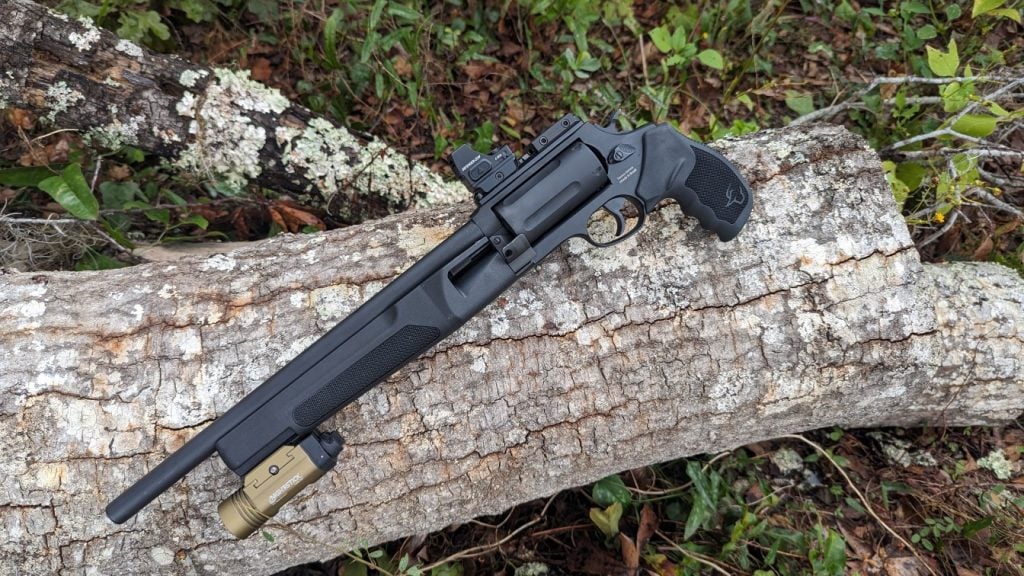
With that in mind, I figured it couldn’t hurt to give the new Taurus Room Broom a shot and sent Taurus an email. They very promptly responded, and before I knew it, my FFL was calling me, and I had a Judge Home Defender in my hands.
The Judge Home Defender: Break It Down
The Judge is still the Judge. It is a .410/45 Colt revolver that utilizes a 3-inch chamber. It’s a five-shot revolver and comes with standard Taurus Judge grips. I think the ATI X2 Scorpion grip will be replacing the standard grip.
The Home Defender stretches the Judge to the extreme. It’s 19.50 inches long with that 13-inch barrel. The weapon weighs 58.6 ounces, and it’s not afraid to be big and mean. The barrel is surrounded by what I would call a handguard. It certainly makes it easy to use your second hand to support the weapon, and it’s nearly 60 ounces of steel and polymer. Taurus installed a set of shields to the sides of the cylinder to keep the blast that emanates from between the barrel and the cylinder from burning your support hand.

That handguard features a rail at the end that makes adding a light easy and capable. I added a Nightstick weapon light to the gun, and a serious home defense weapon needs a white light. Up top, we have a fairly long-sight rail, which I topped off with a Vortex Defender-CCW, and it’s included a Picatinny rail adapter. I figured if the gun was called the Defender and the optic was called the Defender, it would double its defensive capabilities.
Adding a Side Saddle
There was a lot of rail left, so what’s a man to do? I went looking for a side saddle of some kind. I figured I needed a rail mount to make my own, but then I ran across a Monstrum tactical .243 side saddle that attaches to a rail. The little .243 and .410 have nearly identical case diameters, so I hit go. This side saddle was attached to the rail and offered a convenient five slots for spare ammo. It’s a little tight, but I plan to warm it up and loosen the slots up.
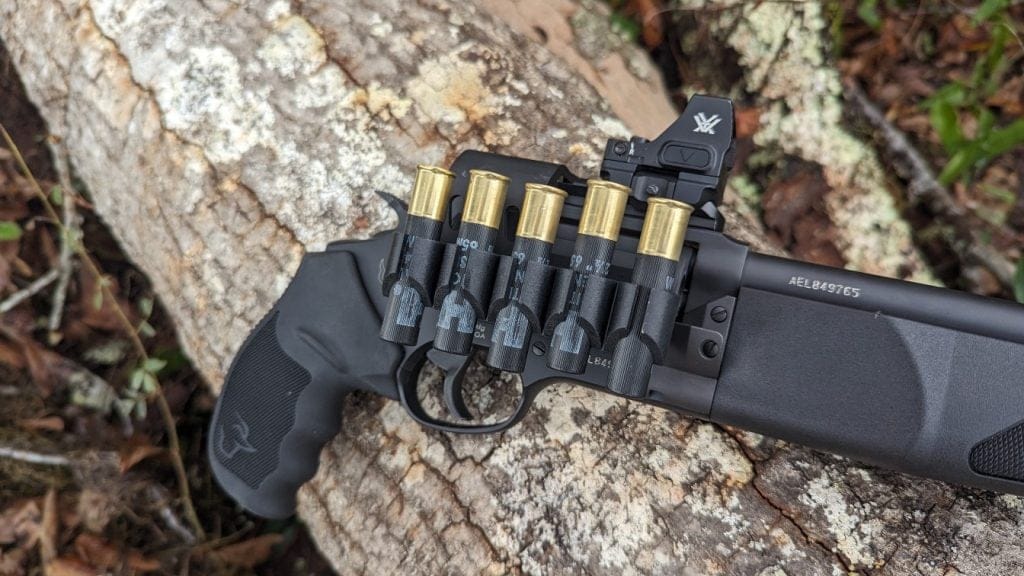
The Judge Home Defender At the Range
I grabbed a ton of .410 ammo for this test. My own Judge broke, but to be fair, it came from 2011ish and Taurus has changed a lot since then. Their guns are now very well-made and much nicer. Still, I grabbed buckshot and birdshot, as well as some Hornady Triple Defense. That’s right; I’m using a Taurus Home Defender, with a Defender red dot and now Triple Defense ammo, to make sure my defense capabilities are maxed out!
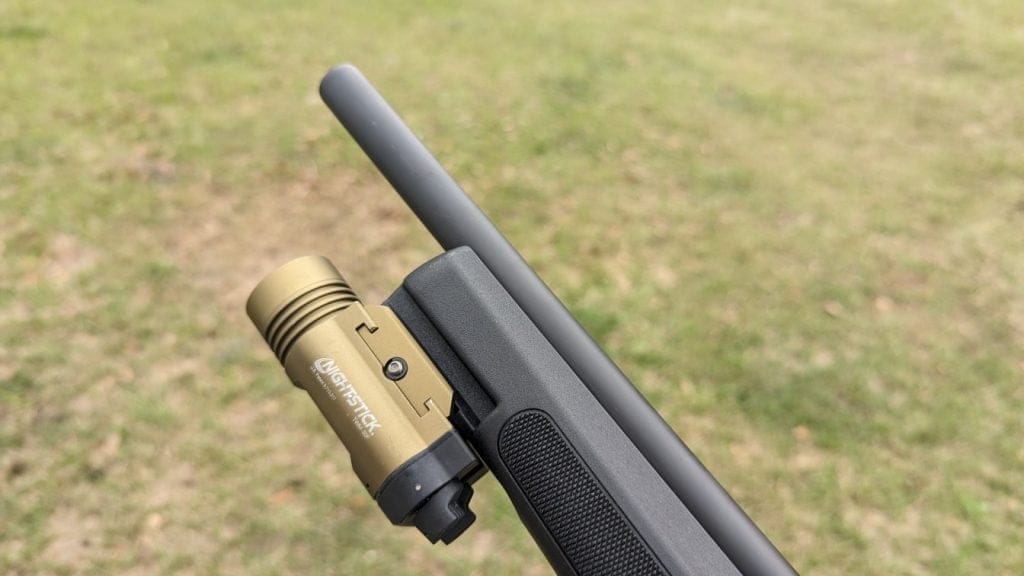
I zeroed the gun with some .45 Colt loads. I zeroed the dot and gun at 25 yards. My thinking is that I want the extra precision at longer ranges, and the dot would be close enough at shotgun ranges. Zeroing was very easy, and I got on target in four shots, which I was thankful for because .45 Colt is pricey.
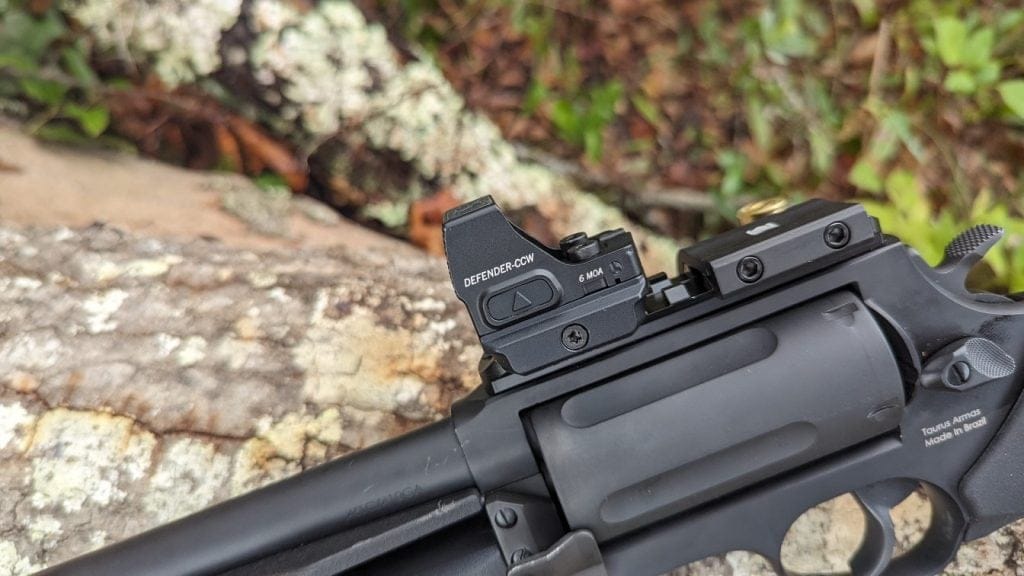
I also did some accuracy testing and fired a nice off-hand five-round group at 25 yards and was pleasantly surprised at the accuracy, seeing as how the round has to travel through a three-inch cylinder before it hits the rifled barrel. I dropped five rounds into a small group with one annoying flyer that almost completely ruined it.

Out to 50 yards, I used the gun in single-action and routinely rang the steel of an IPSC target with those hefty .45 Colt loads. I believe it was the Gunday Brunch podcast where one of the hosts captured my feelings about .45 Colt perfectly. “I don’t believe in stopping power, but when I load a .45 Colt round into a revolver, I almost believe in it.”
The .410 Effect
I had a hell of a time finding .410 buckshot. I only got to test Winchester Super X loads. They patterned a bit wide, as you expect from a rifled bore. At 15 yards, the pellets all hit an FBI Q target but patterned at about a foot.

What worked best was those Hornady Triple Defense loads that packed an expanding slug and two .35-caliber balls. They patterned in a group smaller than my hand at 15 yards. Plus, believe it or not, they were cheaper than the Winchester Super-X buckshot loads. Hornady’s ammo was less than a buck a round, and I paid $15 for a box of five .410 buckshot shells.

I used birdshot shells just for cheap shooting fodder and had a ton of fun with it. The pattern is wide and conical, making it like a net of birdshot. It would erase a snake, and I’d be lying if I said I didn’t want to try to hit clag pigeons with it.
The .410 Complications
The shields do a pretty good job of blocking the hot gas. They don’t catch it all but block most of it. I learned throughout my shooting that day that buckshot and 45 Colt delivered less gas and burning powder to your arm than birdshot loads. I had some Fioochi birdshot that was really dirty and threw lots of gas and powder into my forearm. After 50 rounds of that particular load, I had little speckles of blood and dark carbon staining on my arm. Buckshot and .45 Colt hit me with some gas, but it wasn’t painful.

That same cheap Fiocchi load was also a pain to load and unload. The casings must be thicker than average. When fired, a punch is required to remove them. Birdshot from Federal and Remington did not have this issue, and neither did any of my buckshot loads.
Unloading the Home Defender Judge
The recoil was surprisingly light. Even with three-inch buckshot loads and the dedicated defensive loads from Hornady, the gun didn’t buck or jump much at all. The .45 Colt loads were tame, although these were marked cowboy loads, so they weren’t the hardest-hitting 45 Colt options. Low recoil makes it easy to follow fire quick follow-up shots.

Running the gun in a defensive manner proved to be super easy. I could drill two targets with two rounds of buckshot in less than three seconds from the low ready. The trigger is so much better than my original Judge. The double-action design is super smooth and makes quick follow-up shots easy and accurate.
For Home Defense?
That’s the big question. I would advise using a rifle over a .410 or just going big with a 12 gauge. However, I can’t possibly understand everyone’s unique situation, and if you want to use .410, then go for it.
So, is the Judge Home Defender a worthy home defense weapon?
As much as it pains me to admit it, yes, it is. I wrote an entire article about why I don’t like .410 revolvers, but I do like this one! It’s more akin to a shotgun. I almost wish Taurus would make a smooth-bore .410-only version in an NFA configuration. Even short of that, the Judge Home Defender is surprisingly nice.
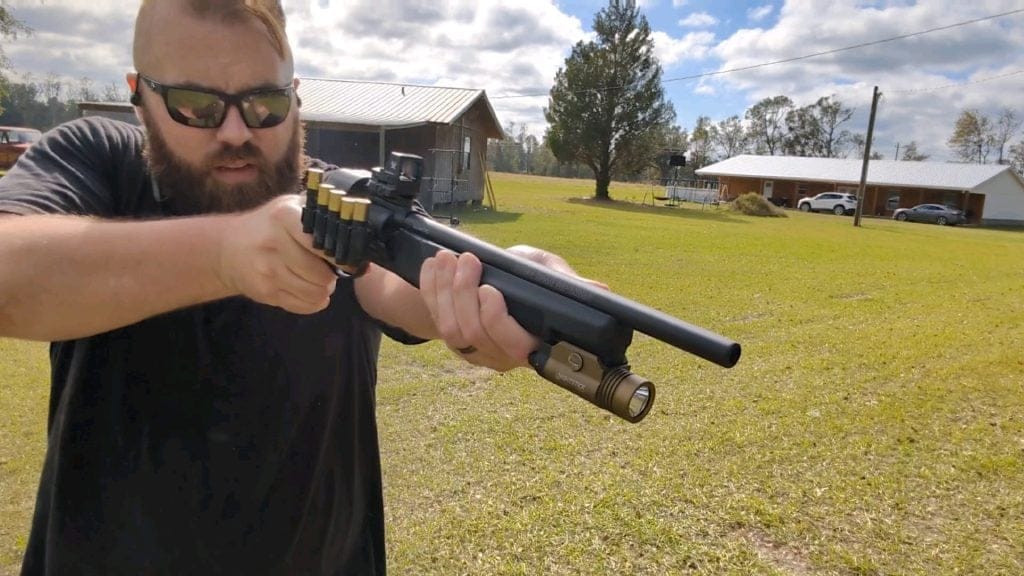
Good accuracy, low recoil, and excellent reliability combined with a capable caliber make the Home Defender an effective weapon. Unlike a pump shotgun or something like the Shockwave in .410, it can be used with a single hand. It’s also almost seven inches shorter than the firearm variants of .410 shotguns.
The Judge Home Defender seems like a novelty weapon, but as the range time proved, it’s a capable weapon. Plus, it’s just tons of fun to shoot.

